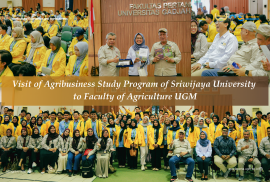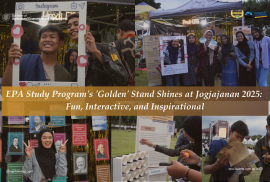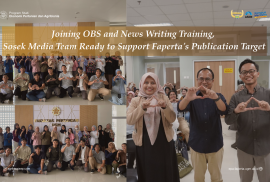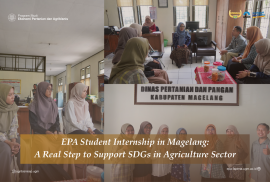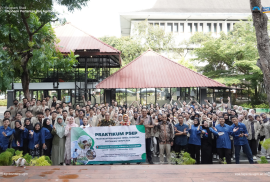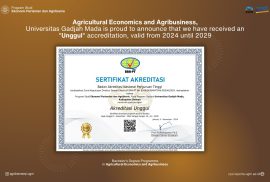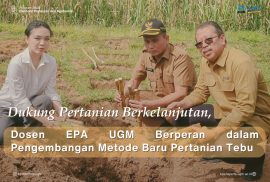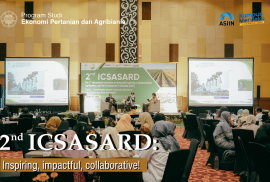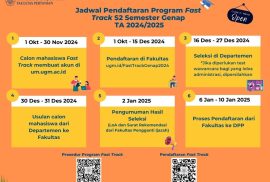Yogyakarta, May 19, 2025 – Faculty of Agriculture Universitas Gadjah Mada (UGM) received an academic visit from Agribusiness Study Program, Sriwijaya University (UNSRI). The activity on Monday was attended by 18 lecturers and 185 students from the UNSRI agribusiness Study Program. The group was received directly by the Department of Agricultural Social Economics, especially from the Agricultural Economics and Agribusiness Undergraduate Study Program (EPA), Master of Agricultural Economics Study Program (MEP), Master of Agribusiness Management Study Program (MMA), and the Agricultural Social Economics Student Family (KMSEP).
agricultural economics
Yogyakarta, May 12, 2025 – Keluarga Mahasiswa Soisal Ekonomi Pertanian (KMSEP), Department of Agricultural Socioeconomics (SOSEK) UGM successfully organized Jogjajanan 2025, a biennial event anticipated by students, alums, and the general public. At Pancasila Field UGM, the event was lively and energetic, combining creative competitions, culinary bazaars, interactive entertainment, and a spectacular music concert that aroused the enthusiasm of visitors from all walks of life.
✨ EPA’s “Golden” Stand: Fun, Informative, and Full of Prizes!
One of the highlights of Jogjajanan 2025 was participating in the Agricultural Economics Study Program (EPA), which enlivened the event by opening an interactive stand with the theme “Golden”. To introduce itself to the broader community, the Agricultural Economics Study Program (EPA) also enlivened Jogjajanan by appearing striking with golden yellow ornaments that depict passion, energy, and glory. The EPA stand was visually appealing, interactive, and educational. Every visitor was greeted with an informative brochure about the EPA Study Program. After reading the brochure, visitors were invited to play fun games and answer light quizzes about the EPA.
Sleman, April 26, 2025 – The month of Syawal is a meaningful moment, especially for the big family of the Department of Social Economics (Sosek), Faculty of Agriculture, Universitas Gadjah Mada. On Saturday, April 26, 2025, a warm atmosphere full of family felt thick in the Syawalan event held at Sendang Ayu, Kalasan, Sleman, with the theme “Sucikan hati, rajut silaturahmi, tingkatkan kolaborasi dan sinergi.” This event became a gathering place for active lecturers, retired lecturers, and education staff to strengthen the post-Ramadan relationship.
Yogyakarta, April 25, 2025-In order to improve content production and news writing skills, the Department of Agricultural Social Economics (Sosek) Media Team consisting of Adinda, Adhika, April, Inay, Mila, Mirda, Manda, Dinda, and Arsya participated in the “Open Broadcaster Studio (OBS) and Article Writing Training” organized by the Faculty of Agriculture UGM on Friday (25/04/2025). Located in Co-working Space 1 AGLC 6th Floor, this training was attended by the Faculty Media Team and Media Teams from various departments.
Magelang, April 22, 2025 – The supervisor team of the Merdeka Learning Campus Merdeka (MBKM) Internship Program from the Agricultural Economics and Agribusiness Study Program (EPA), Faculty of Agriculture, Gadjah Mada University, carried out monitoring and evaluation activities for students who were undergoing the MBKM internship program at the Agriculture and Food Service Office of Magelang Regency.
During this visit, the accompanying lecturers discussed directly with the DPP of Magelang District, including the Head of the General and Personnel Subdivision, to review the development and contribution of students over the past two months. Currently, students are placed in several Agricultural Extension Centers (BPP) in various sub-districts and are scheduled to complete their placement in BPP on May 7, 2025.
Students of the 2022 Agricultural Economics and Agribusiness Study Program conducted an Agricultural Socio-Economic Assessment Practicum in Gunung Kidul Regency on November 1-4, 2024. The activity aims to provide students with information on the socio-economic conditions of farmers in Gunungkidul Regency through surveys and direct interviews with farmers.
The Agricultural Socio-Economic Assessment Practicum has a series of activities that allow students to have reliable academic abilities. After conducting field practicums by interviewing farmers, students then write the results of their studies in the form of a scientific report containing the general conditions of the area, characteristics of respondents, analysis of social conditions, analysis of costs, income, profits of farming businesses and the level of farmer welfare. This is expected to provide students with an overview of the portrait of farming businesses in Gunung Kidul Regency and the conditions of farmers’ households. To facilitate the implementation of the practicum, students are accompanied by a practicum assistant and a supervisor. The series of practicum activities are closed with an exam with a lecturer in the form of a presentation of the results of the analysis.
On November 5, 2024, the Agricultural Economics and Agribusiness Study Program successfully achieved “UNGGUL” Accreditation from BAN-PT (National Accreditation Board for Higher Education). The accreditation was determined based on the Decree of BAN-PT Number 6549/SK/BAN-PT/Ak.KP/S/XI/2024 concerning the Conversion of Accreditation Rankings for the Agricultural Economics and Agribusiness Study Program in the Undergraduate Program at Universitas Gadjah Mada, Sleman Regency. This accreditation is valid from November 5, 2024 – July 10, 2029. This achievement proves the commitment of the UGM Agricultural Economics and Agribusiness Study Program to support the Sustainable Development Goals (SDGs) point 4, namely quality education.
On October 29, 2024, the UGM Faculty of Agriculture, in collaboration with the Kana Cooperative and the Agam Regency Government, held counseling for sugarcane farmers in Kanagarian Lawang and Kebagarian Tigo Balai, Matur District. The event, which was held at the Lawang Village Head Office, aimed to introduce a new, more efficient method of planting sugarcane using the ringpit technique.
Low productivity and yield, as well as limited sugarcane supply, are problems faced by all sugarcane farmers. This has an impact on the less-than-satisfactory income of sugarcane farmers. Not only that, but the performance of the sugar industry, which relies on supplies from community sugarcane, is also not optimal. The low productivity and yield are caused by substandard cultivation techniques. The use of suboptimal inputs has an impact on low productivity and sugarcane yield. Therefore, the ringpit technique is a solution to increase the efficiency of water and nutrient absorption.
On October 17, 2024, the Department of Agricultural Socioeconomics, Faculty of Agriculture, Universitas Gadjah Mada (UGM) held the second International Conference on Sustainable Agricultural Socioeconomics, Agribusiness, and Rural Development (ICSASARD). This international conference was held to support the transformation of essential sectors to create a sustainable, resilient, and prosperous society.
ICSASARD 2024 covers 7 issues, including
1. Low Emission Development (LED) for sustainable agriculture
2. Information, Communication and Technology (ICT) for sustainable agriculture
3. Climate change and natural resources resilience for food systems
4. Sustainable food value chain
5. Food and nutrition security
6. Social transformation towards sustainable food system
7. Inclusive Rural Development
Hello #SobatEPA!
Do you know about the Fast Track Program? The Fast Track Program is an accelerated study program for undergraduate students (S1) to be able to continue to the master’s level (S2) so that they can complete their undergraduate (S1) and master’s (S2) studies in just 5 years! Interesting, isn’t it?
The Fast Track Program is open to all students of the UGM Faculty of Agriculture who are interested in continuing their studies in the master’s program at the UGM Faculty of Agriculture. There are two Master’s Programs in the UGM Department of Agricultural Socioeconomics, namely a Master of Agricultural Economics and a Master of Agribusiness Management.

